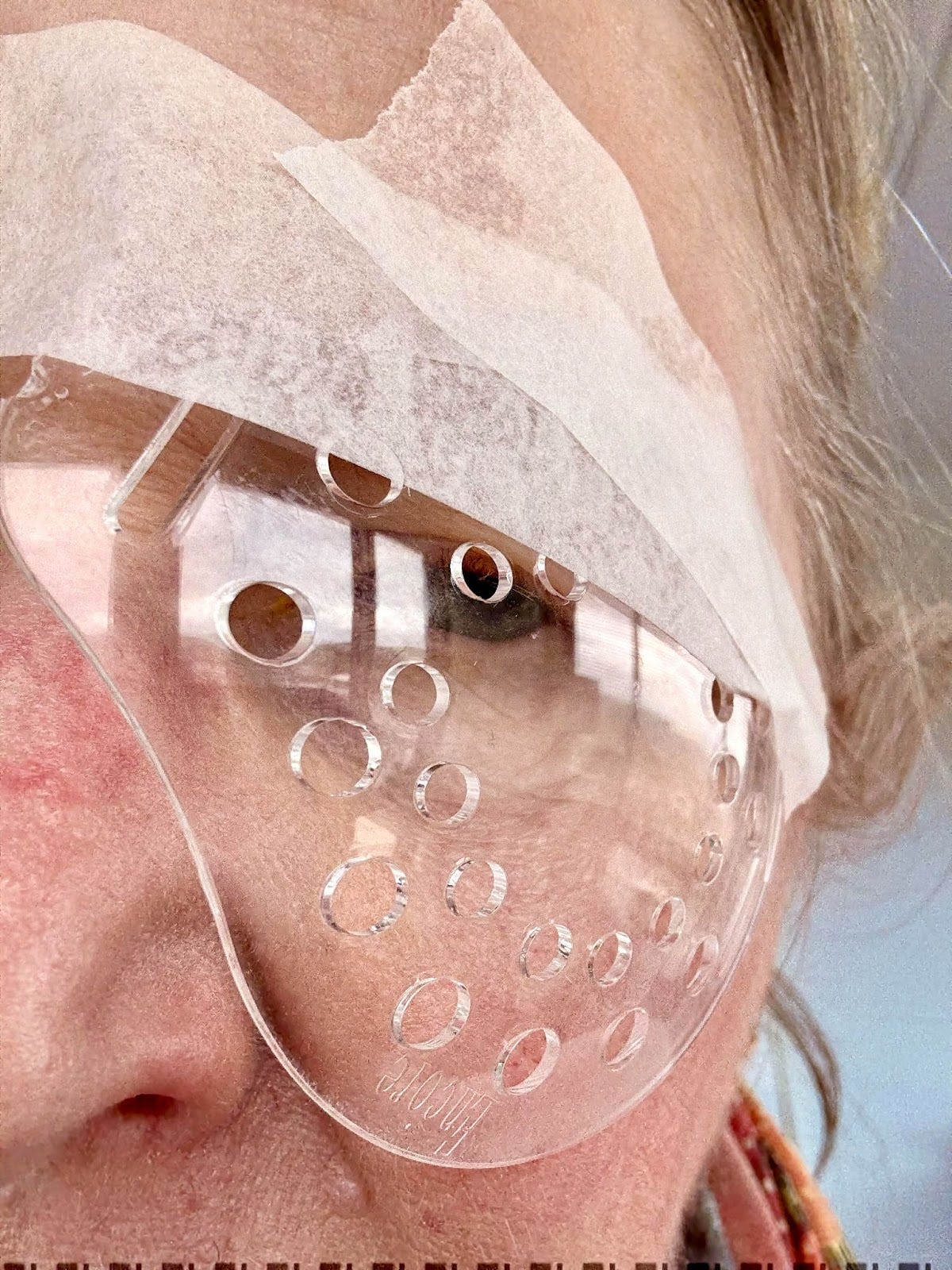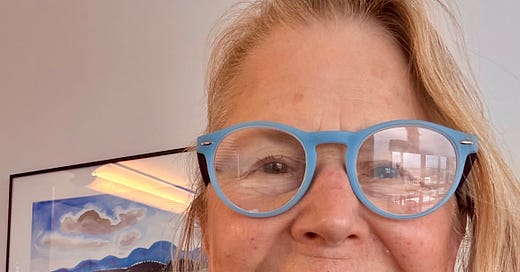💬 [B]old Women: How’s your eyesight? Mine’s shitty
but after cataract surgery this week…
I’d love to hear from [B]old Women for this discussion of aging eyesight. [B]old Men welcome to join in too! - Debbie
When my eye surgeon appeared at my side in the crowded pre-op area (a dozen blue-clad techs were rushing back and forth to prep me and a handful of other patients), she looked like an angel—small, calm, and neatly dressed in lighter blue scrubs and a matching blue surgical bonnet. For what seemed like close to an hour, I’d been sitting in a hospital bed, IV-inserted and at the ready, feeling as if I were in Grand Central Station with a whirlwind of activity around me—but no one actually paying any attention. Finally, here was the surgeon focusing on me and my left eye, for my upcoming cataract1 surgery!
I was (a teeny bit) terrified about both the anesthesia and the surgery, so I peppered her with questions. Is the anesthesiologist really going to stick a needle in my eye? “No.” Are you sure it won’t hurt? “Yes.” How do you get the old lens out of my eye and put the new one in? “Ah,” she replied in a magnificently reassuring voice, “Let ME worry about that and do my job. I can tell you about that later.”
Twenty-five years ago, I leapt at the chance to have LASIK surgery. It was still a new thing, and right after the surgery–my nearsightedness corrected!–it seemed like a miracle. I could wake up and get out the door to an early yoga class without putting in my contacts. I could see audience faces when I was giving a talk. I could see the movie screen and actors on stage.
But over the years, my vision has degraded in ways that make it truly wonky2. Wonky is how I explain my poor eyesight to friends and family and even in the eye doctor’s office to describe my increasingly double3, fuzzy vision. So here’s a brief saga of my worsening eyesight, which I’m hoping at least some of you can relate to.
I had LASIK done as monovision because I’d been wearing contacts that way and was used to it. This means my left eye was corrected so I could see clearly up close (aka without putting on reading glasses); my right eye was corrected for distance. Somehow my brain compensated for this dual vision by fusing the images so I could see clearly when I looked into the distance.
Unfortunately, over time, my eye muscles weakened4 and my brain became less able to “fuse” the near and far images; my depth perception practically vanished; and night driving, with oncoming lights, was terrifying5. Walking on uneven terrain, whether a hiking path or a city sidewalk, has been particularly challenging because I have to think about each step. In low light, I could hardly see, whether it was to read a book or find my husband in a crowded waiting room. I’ve walked by him too many times to count.
A partial solution for distance vision was to wear glasses with prisms6 to correct the double vision; it worked, sort of. Reading in bed had become more and more difficult without a direct, bright light. I’d been asking my ophthalmologist about cataract7 surgery for several years; finally, she said yes, the time was right; and referred me to a surgeon colleague (the angel).
Gulp… here’s what the surgery was like, three days ago8.
Back to the operating room… more than you want to know about cataract surgery
I don’t remember much after my surgeon departed again for the OR. The anesthesiologist approached and pushed a “cocktail” of sedatives9 into my IV. (I could have refused this, as the woman in the pre-op bed next to mine did; I figured she was crazy, or very, very brave.) The next thing I remember is the surgeon saying gently, “Hold still so the laser can do its thing; you will feel a little pressure.” I was in the OR, draped except my left eye, but I have no memory of being wheeled in. The anesthesiologist had used a local lidocaine to numb my eye so I didn’t feel anything, but I was intentionally awake enough, despite the sedative, to be able to hear the surgeon. I had opted for the more expensive surgery “package,” which includes a Femto laser10 making the initial (VERY quick) incision. It makes a cleaner cut and, my eye surgeon explained later (making good on her promise), it makes it easier for her to suck out the emulsified cataract lens and insert the new artificial clear IOC (intraocular lens).
If you want the microscopic details…
The proteins that make up the ocular lens are softened by the laser and then broken up into tiny chunks by the ultrasound probe inserted by the surgeon; the probe also sucks out the microscopic chunks. The new artificial lens is “folded” and slipped into place through the 2 mm (millimeter) incision, about the size of a sharp pencil point. The whole procedure takes 12 minutes, my surgeon told me. Cool, huh?!

So how is my [b]old left eye doing?
Three days post-op, the swelling and inflammation from the surgery continue to diminish (they are not visible), and the distance vision in my left eye is surprisingly sharp—MUCH better than before. I have no pain at all, and no feeling of scratchiness, or other reminder of surgery. Another big improvement is that the colors I see through my left eye are much brighter and “whiter” than with my right eye—a common result because cataracts make colors less bright and give everything a yellow-ish tone.
All considered, I’m looking forward to cataract surgery on my right eye in two weeks! I expect my vision to become clearer and sharper overall; but (spoiler alert) I will still need to wear glasses to correct my diplopia. And will continue to be very dependent upon reading glasses.
A glass of sherry before operating…
My physician husband asked me to add that his great great great grandfather performed the first cataract surgery in the U.S. in about 1820, after training in England; the story goes that Edward Reynolds MD stepped into the library, drank a glass of sherry, said a prayer—and then operated on his father (who, apparently, was the only person willing to undergo the new operation).
Subsequently, Reynolds co-founded Boston Eye and Ear, now part of Mass General; there has been a physician in every generation of Sam’s family since (both our daughters are MDs).
Questions for discussion:
Today I’m wondering about your vision!
Have you had cataract surgery, and, if so, what changes or improvements in your eyesight have you noticed?
Has your eyesight degenerated11 as you age? In addition to cataracts, macular and retinal changes are age-related.
What [b]old adaptations might you be making in your life because of your changing vision?
A cataract is when the normally clear lens of an eye becomes cloudy because of the breakdown of proteins; things may look hazy, fuzzy and less colorful.
My LASIK surgery was a success; my worsening eyesight was not the fault of the surgeon.
Seeing double is called diplopia.
I also have adult strabismus, meaning my eyes are misaligned. This occurs in a subset of people whose aging eye muscles sag more than average, like upper arms sag.
Night vision problems, including halos, glare, and starbursts around lights, are a known complication / side effect of LASIK surgery.
Prisms are inserted into regular lens prescriptions in order to “trick” the eye into believing that an object is in a different location (which, ideally, reduces double vision).
Cataracts are a natural part of aging and may not be noticeable, or troublesome, for years. Most opthalmologists don’t like to rush into cataract surgery before it’s really necessary (and before it’s reimbursable by insurance).
This was an outpatient procedure in a free-standing surgery clinic in Connecticut.
A potent mixture of Versed, Fentanyl, and Zofran; this stuff really works. In addition to having pain and anxiety-free surgery, I slept all afternoon once I got home.
The Femto laser is named after a femtosecond, a unit of time measured as one quadrillionth of a second.
Age-related eyesight problems include macular degeneration (a gradual loss of sharp, central vision), retinal degeneration (the breakdown and loss of photoreceptor cells), and retinal detachment, which can cause permanent loss of vision.
![[B]OLD AGE with Debbie Weil](https://substackcdn.com/image/fetch/$s_!i8Z0!,w_80,h_80,c_fill,f_auto,q_auto:good,fl_progressive:steep,g_auto/https%3A%2F%2Fsubstack-post-media.s3.amazonaws.com%2Fpublic%2Fimages%2Fdaaca764-d8d6-4a1b-bf58-61dbb72810fc_842x842.png)
![[B]OLD AGE with Debbie Weil](https://substackcdn.com/image/fetch/$s_!fEcd!,e_trim:10:white/e_trim:10:transparent/h_72,c_limit,f_auto,q_auto:good,fl_progressive:steep/https%3A%2F%2Fsubstack-post-media.s3.amazonaws.com%2Fpublic%2Fimages%2F95ad4442-e435-4ebc-a8d2-9c9b89a8bdb6_2100x400.png)

![[B]OLD AGE with Debbie Weil](https://substackcdn.com/image/fetch/$s_!i8Z0!,w_36,h_36,c_fill,f_auto,q_auto:good,fl_progressive:steep,g_auto/https%3A%2F%2Fsubstack-post-media.s3.amazonaws.com%2Fpublic%2Fimages%2Fdaaca764-d8d6-4a1b-bf58-61dbb72810fc_842x842.png)





After my late grandmother had her cataract surgery; she called one day so very upset with me. "Why didn't you tell me there was a ring around my bathtub? I am horrified!"
I just thought I was visiting and she had not cleaned the tub that week, but it was in fact due to her cataracts -- she thought it was clean and had missed the ring. Which is how I knew it was time to ask my living grandmother if she had a cataract because there was a ring around her tub. Turns out, she was ready for surgery in both eyes.
Hi Debbie,
One eye down, one to go. My vision has deteriorataed as I've aged, but I still passed my driver's license test this year! I'm farsighted, so I struggle with anything up close. I have trouble with my prescription glasses - they're progressive - they work fine for distance but for reading not great. And for computer work, no way. My doctor and I have decided I might just be one of those people who needs glasses just for computer and reading stuff and another pair for driving and other distance stuff.
Eye-related surgery really scares me. So far, no cataract surgery, but my doctor's watching things closely. Oh, and floaters, they bug the crap out of me. Annoying, but it's amazing how we get used to them.
Thank you for sharing about your surgery. Good luck with eye #2.